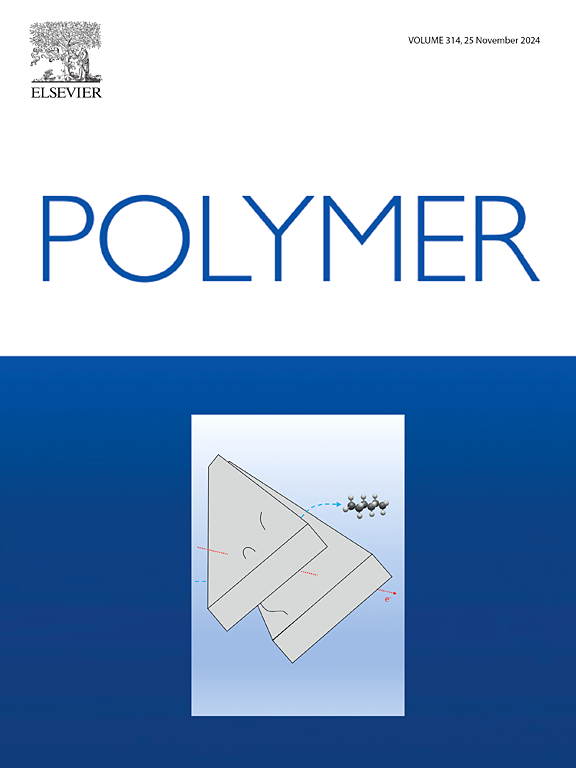Phase behavior and hydrate crystallization kinetics in polyoxacyclobutane−water mixtures: Effects of molecular weight
IF 4.5
2区 化学
Q2 POLYMER SCIENCE
引用次数: 0
Abstract
Polyoxacyclobutane, -[(CH2)3–O-]n has the unusual ability to co-crystallize with water to form a hydrate. But above the hydrate melting temperature, POCB/water mixtures phase separate into a liquid-liquid equilibrium state. Thus, the POCB-water system appears to be the only example of a polymer co-crystallizing with a solvent with which it is immiscible in the amorphous state. We examine the dependence of phase behavior and hydrate crystallization kinetics on the POCB molecular weight. In the molecular weight range from ∼1 kg/mol to ∼12 kg/mol, the hydrate melting temperature is found to be nearly insensitive to molecular weight. Above the hydrate melting temperature, the mixtures are in liquid-liquid equilibrium where the water-rich phase is nearly pure at all molecular weights, whereas the fraction of water in the POCB-rich phase decreases with increasing molecular weight. We also examine isothermal hydrate spherulite growth, which occurs exclusively within the POCB-rich phase. The spherulite growth velocity is found to decrease with increasing molecular weight regardless of whether samples are compared at fixed temperature or fixed undercooling. The spherulite growth velocity of the POCB hydrate is orders of magnitude higher than of pure POCB at the same temperature indicating that, as long as sufficient water is available, hydrate co-crystallization will always outcompete POCB homopolymer crystallization.


聚氧环丁烷-水混合物的相行为和水合物结晶动力学:分子量的影响
聚氧环丁烷-[(CH2)3-O-]n具有与水共结晶形成水合物的特殊能力。但在水合物熔融温度以上,POCB/水混合物相分离成液-液平衡态。因此,pocb -水体系似乎是聚合物与溶剂共结晶的唯一例子,它在无定形状态下与溶剂不混溶。我们研究了相行为和水合物结晶动力学对POCB分子量的依赖性。在分子量为~ 1kg /mol ~ ~ 12kg /mol的范围内,水合物的熔融温度对分子量几乎不敏感。在水合物熔融温度以上,混合物处于液-液平衡状态,富水相在所有分子量下几乎都是纯的,而富pocb相中的水含量随着分子量的增加而减少。我们还研究了等温水合物球晶生长,这只发生在富含pocb的相中。无论样品是在固定温度下还是在固定过冷下进行比较,球晶生长速度都随着分子量的增加而降低。在相同温度下,POCB水合物的球晶生长速度比纯POCB高几个数量级,这表明只要有足够的水,水合物共结晶总是优于POCB均聚物结晶。
本文章由计算机程序翻译,如有差异,请以英文原文为准。
求助全文
约1分钟内获得全文
求助全文
来源期刊

Polymer
化学-高分子科学
CiteScore
7.90
自引率
8.70%
发文量
959
审稿时长
32 days
期刊介绍:
Polymer is an interdisciplinary journal dedicated to publishing innovative and significant advances in Polymer Physics, Chemistry and Technology. We welcome submissions on polymer hybrids, nanocomposites, characterisation and self-assembly. Polymer also publishes work on the technological application of polymers in energy and optoelectronics.
The main scope is covered but not limited to the following core areas:
Polymer Materials
Nanocomposites and hybrid nanomaterials
Polymer blends, films, fibres, networks and porous materials
Physical Characterization
Characterisation, modelling and simulation* of molecular and materials properties in bulk, solution, and thin films
Polymer Engineering
Advanced multiscale processing methods
Polymer Synthesis, Modification and Self-assembly
Including designer polymer architectures, mechanisms and kinetics, and supramolecular polymerization
Technological Applications
Polymers for energy generation and storage
Polymer membranes for separation technology
Polymers for opto- and microelectronics.
 求助内容:
求助内容: 应助结果提醒方式:
应助结果提醒方式:


